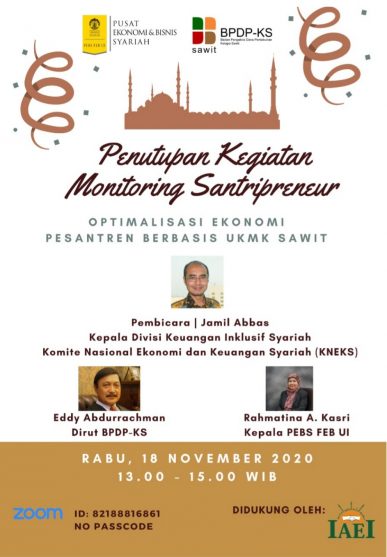PEBS FEB UI Webinar, “Optimizing the Economy of Palm Oil SME-Based Islamic Boarding Schools” and Program Closing
DEPOK – (11/18/2020)
On Wednesday (18/11/2020), the Center for Sharia Economics and Business (PEBS) FEB UI together with the Oil Palm Plantation Fund Management Agency (BPDP KS), which is supported by the Association of Islamic Economics Experts (IAEI) held a webinar with the theme “Optimizing the Economy of Islamic Boarding Schools UKMK Sawit”. This marked, at the same time, the closing of the “The Development of Palm Oil MSME-based Santripreneur Potential as a Regional Economic Empowerment Program”.
The main resource person attending was Jamil Abbas, Head of the Sharia Inclusive Finance Division, National Committee for Sharia Economics and Finance (KNEKS), moderated by Hapsari Setyowardhani, Lecturer at the Department of Management, FEB UI.
The activity was opened by Rahmatina Awaliah Kasri, Head of PEBS FEB UI, who said that Islamic boarding schools have potential in the economic development of the ummah and are expected to be one of the drivers of the acceleration of the sharia economy, the halal industry, and economic independence. However, in reality conditions are not yet optimal because of many existing underdeveloped pesantren businesses.
The palm oil UKMK-based Santripreneur development activities were conducted with support from the BPDP-KS,. The program aimed to foster a culture of entrepreneurship in the pesantren environment, in order to optimize the economic potential based on palm oil products and its derivatives, and to increase the income and economic welfare of the Islamic boarding schools and their environment, both institutionally and the personnel.
These mentoring activities have been held in three provinces that have the potential for palm oil development, namely North Sumatra, Riau and South Sumatra, and were attended by a total of 90 participants. Rahmatina also explained that this activity had resulted in various businesses in Islamic boarding schools, some of which were directly related to palm oil products such as oil palm nurseries, herbal soap products, maggots, and others, while others were calligraphy, bottled drinking water, culinary delights, and so on.
In his presentation, Jamil Abbas said that Baitul Maal wat Tamwil (BMT) is a unique sharia financial model because it combines social finance and commercial finance. The difference between BMT and conventional institutions is the existence of ZISWAF (Zakat, Infaq, Alms, Waqf) which makes BMT a comprehensive microfinance institution because it has products for all segments of the society it serves.
The original spirit of BMT is to improve the welfare of people in weak segments by providing the right Islamic financial services. If you attempt to establish a BMT in a pesantren, then focus it as an economic empowerment engine for the pesantren for common welfare and involve all stakeholders in the pesantren. Meanwhile, the Sharia financial services collaboration program (KoLaKS) from KNEKS aims also to provide appropriate sharia financial services in Islamic boarding schools, through the establishment of a Sharia Financial Service Unit.
Thus, this program is intended to increase synergy and collaboration for mutual welfare.
This activity was closed with a directive by Helmi Muhansah, Head of the UKMK BPDP-KS Division. Helmi expressed his gratitude to all parties involved in this activity, namely PEBS FEB UI, IAEI, and the participants from the pesantren who had participated in this activity. In the future, this program is expected to continue after evaluating and improving and collaborating with relevant stakeholders, including the KNEKS, to expand the area of activity and intensify the material that can be conveyed to participants of the palm oil UKMK-based pesantren.
Collaboration can also be conducted with partners currently in BPDP KS, such as SBRC IPB to produce soap, hand sanitizer, and palm cosmetics, which are expected to be taught to the participants later. In addition, there is also cooperation with BPPT regarding palm-based batik, so that it can be taught later to the participants. Another collaboration is with the ITB Indonesian Bio Hydrocarbons Society, which is to produce palm-based fuel. The hope is that the palm oil-based Islamic boarding schools can take advantage of this bio hydrocarbon potential.
Helmi said that the BPDP-KS is ready to collaborate with SME-based Islamic boarding schools and other stakeholders for sustainable palm oil development. (hjtp)
(am)




